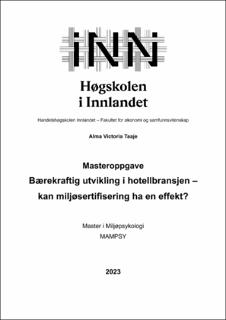Bærekraftig utvikling i hotellbransjen – kan miljøsertifisering ha en effekt?
Master thesis
Permanent lenke
https://hdl.handle.net/11250/3076213Utgivelsesdato
2023Metadata
Vis full innførselSamlinger
Sammendrag
Reiselivsbransjen er i stor vekst og står for om lag fem prosent av de globale klimagassutslippene. Hoteller er derfor en viktig bidragsyter i reiselivsnæringens grønne omstilling, hvor miljøsertifisering kan være et effektivt virkemiddel i kampen mot klimaendringene. Målet med masteroppgaven er derfor å identifisere hvordan norske hoteller som er Miljøfyrtårnsertifisert har utviklet seg på kategorier for avfall, energibruk, «grønne» innkjøp og vannforbruk over tid. En slik undersøkelse har ikke blitt gjort tidligere og resultatene bidrar derfor med ny kunnskap på området. Studien benytter kvantitative analyser av rådatamaterialet fra Miljøfyrtårnsertifiserte hoteller i Norge, og variablene er målt i en periode over 13 år i fem tidsintervaller, henholdsvis sertifiseringsår 1, 4, 7, 10 og 13. Det var stor variasjon over tid i de enkelte kategoriene, men sammenlignet med det første året hotellene er Miljøfyrtårnsertifisert var avfallsmengden samlet sett redusert med 41,25 %. Utviklingen for energiforbruk viser en økning totalt, hvor fjernvarme står for store deler av denne økningen. For «grønne» innkjøp var det en signifikant vekst i økologiske produkter i frokostbuffeten og miljøsertifiserte leverandører. Samtidig var det en nedgang i vannforbruket på 35,88 % fra år 1 til år 13. Resultatene viste altså at miljøsertifisering har hatt en positiv effekt på miljøvariabler for «grønne» innkjøp, noe varierende, men likevel positive resultater på variablene for avfallshåndtering og vannforbruk. Miljøsertifiseringen synes ikke å ha særlig effekt på energibruk. Studien viser at miljøsertifisering kan bidra til bærekraftig utvikling i hotellbransjen og reiselivet generelt. Satsningsområdene fremover bør være på å oppnå en bedret avfallshåndtering, samt en reduksjon i både energibruk og vannforbruket. The tourism industry is growing rapidly and accounts for approximately fem percent of the global greenhouse gas emissions. Hotels are thus an important contributor to the tourism industry’s green transition, where environmental certification can be an effective tool in the fight against climate change. The aim for this thesis is therefore to identify how Norwegian hotels that are Eco-Lighthouse certified have developed over time in categories for waster, energy use, “green” purchases and water consumption. Such a study has not been conducted before and the results therefore contribute with new knowledge to the field. The study use quantitative analyses of data from Eco-Lighthouse certified hotels in Norway, and the variables were measured over a period of 13 years in five time intervals, respectively certification years 1, 4, 7, 10 and 13. There were large variations over time in the individual categories, but compared to the first year the hotels were Eco-Lighthouse certified, the overall amount of waste was reduced by 41,25 %. The development for use of electricity shows a total increase, with district heating accounting for most of this increase. As for “green” purchases, there was a significant growth in the amount of ecological products in the breakfast buffet and environmentally certified suppliers. At the same time, there was a decrease in water consumption of 35,88 % from year 1 to year 13. The results thus showed that the environmental certification had a positive effect on environmental variables for “green” purchases, somewhat varying but still positive results for variables on waste management and water consumption. However, the environmental certification did not seem to have a particular effect on energy use. This is one of the first studies to look at the effect of environmental certification in various environmental variables over at long period of time. The study can therefore contribute to the work of both hotels, Eco-Lighthouse and other certification schemes, and the Norwegian authorities, in order to succeed with the sustainable development in the hotel industry and tourism in general. The area of focus for these in the future should be to achieve an improved waste management, as well as a reduction in both energy use and water consumption.
